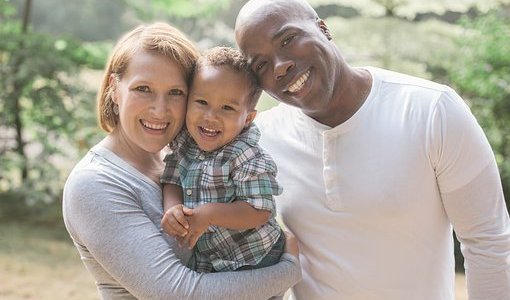Where does the persistent myth come from that people live like kings on public assistance? Probably from people who have never been there.
Anthony and I both come from tough economic backgrounds. My family was on government assistance for awhile; his was not, but struggled all the same. Neither of us ever went hungry, but there were sometimes strings of days where oatmeal was dinner. And while we are thankful to be raising our own child in better financial circumstances, there are things we learned growing up this way that we don’t want to lose – and that we hope to pass on to Adrienne.
Similarly, while we are not religious, we still try to incorporate into our family life some of the traditions we were raised with. One of these is Lent – a season of penance and almsgiving that precedes Easter. One of our family’s Lenten practices has been to spend a week living on the food budget of a family of three who receives SNAP benefits (food stamps). It’s about half of what we spend on groceries in a typical week, and we donate the difference to a local food bank.
There are, of course, many flaws in such an experiment: we know that this is temporary; in the event of a true emergency we could access our usual resources; we have a full-service supermarket where we live, and a car to transport our purchases. But it is a humbling reminder, and it gives Adri a window into what life is often like for families with less – including the ones her parents were raised in. Here are some of the things we learned.
At the grocery store. Adri and I did the week’s shopping. She knew the budget and ran the calculator. Rather than planning a menu and shopping from a list like we usually do (what sounds good for dinner this week?), we shopped the sales and put meals together on the fly based on what was most cost effective, trying to keep health in mind where we could. It took nearly twice as long as usual, but we ended up with these simple meals for the week:
- Tuna helper with peas; apples
- Protein pasta with marinara; grapes
- Homemade chicken and dumplings with veggies; homemade applesauce
- Sloppy joes, celery and carrot sticks, grapes
- Turkey chili and corn bread
- Tilapia, rice, broccoli, bananas
- Leftovers
I felt pretty proud that we put together such a decent menu – for a second. Then I realize that I can do this because Anthony and I come from mothers who were masters at stretching a food dollar, and they passed those skills to us – not just in economizing, but in cooking and keeping food. People who grew up homeless, with addicted parents, in a series of foster homes, didn’t have that kind of stability. Without those skills, where would that leave us? Loading the cart with frozen pizza.
It’s also made possible by our pre-existing prosperity – the grocery store, the car. The grocery store is two miles from home, one way. Divide roughly what the groceries weighed by what I can carry at a time, and I’d have to make that walk every single day – not something I can do while I work full time, as most people on food assistance do. Or, pay four dollars a day round trip transportation, which, even if I could afford it on this budget, doesn’t operate in the evening when I get home from work. Anthony and I also have a regular and dependable work schedules, which means we are home to cook dinner.
At home. Everything takes a lot more work, a lot more thought and planning. If we’re leaving the house we have to think about whether we’ll be hungry while we’re out (no stopping for an unplanned snack or meal out), and plan accordingly. I pre-cut, cooked and parceled up some of the fresh fruit, veggies and hard boiled eggs so we’d have go-to food in the absence of the string cheese, nuts, yogurt and crackers we are used to snacking on but couldn’t afford. But those containers and plastic bags I used to do that were not purchased on this budget. What if I couldn’t afford the containers?
It seems we can’t do anything without thinking about it. Adri drank one of the flavored waters we bought for her lunch, which meant one day during the week there was no drink in her lunch. Not a tragedy, but not something she would normally think twice about – which is the whole idea.
I’m aware that my efforts – cooking, packaging, planning – shield Adri from the full impact of what it’s like to live this way, but I’m not sure how to do it differently. And certainly, that’s what I would do if this was not temporary – just the way our parents did for us. This bit of real life falls on parents hard.
While the meals are as balanced as we could make them, they don’t contain the variety and flavors we’re used to; herbs and spices just don’t fit in the budget. It’s more carb-heavy than the way we usually eat, and I feel sluggish and blue. Food is utilitarian; the enjoyment we derive from planning, preparing and eating healthy, good-tasting meals is nowhere to be found.
The weekend – when we are all home eating all three meals – looms large, and the weekend meals are cobbled together from whatever’s left: Saturday’s breakfast sees one of us eating cereal, another the last bit of egg salad, the other one peanut butter on the last of the bread. No fruit or veggies for anyone, because those are gone.
After. We’re humbled. Grateful for what we have. We slip back into our usual buying and eating patterns thankfully, but with a tinge of emptiness, of sadness, because there are so many people for whom this is not a choice. We also ended the week wanting to hug our mothers, who deployed incredible skill and effort to make a way out of no way; who scrimped and canned and preserved, who saved coins in a jar to buy a kid a McDonald’s cheeseburger once every month or so.
I don’t want to lose the perspective our backgrounds have given us. It’s true we worked hard for what we have, but our place of birth, our talents, our hardworking families – these are all unearned gifts. We didn’t hit a home run; we were born on third base.










